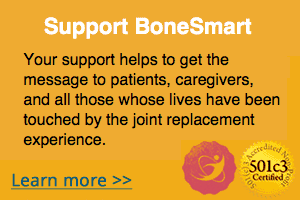After orthopaedic surgery, your doctors and nurses will make every effort to control your pain. While you should expect to feel some discomfort, advancements in pain control now make it easier for your doctor to manage and relieve pain.
Surgeons and their patients are increasingly using alternative methods, such as relaxation techniques and acupuncture, to supplement conventional medicine. A combined approach to pain management is often the best option because it allows the surgeon to tailor pain control methods to each individual patient.
Transcutaneous Electrical Nerve Stimulation (TENS)
In transcutaneous electrical nerve stimulation (TENS) a special device transmits low-level electrical charges into the area of the body that is in pain.
A TENS system consists of a small batter-powered machine connected by wires to a pair of electrodes. The two or four electrodes are connected to your skin near the source of pain or at a pressure point. A mild electrical current travels through your skin and along your nerve fibers which may cause a warm, tingling sensation. A typical TENS session lasts anywhere from 5 to 15 minutes.
Many studies have found that TENS is useful in easing pain after surgery, as well as pain related to injuries, such as fractures and sprains. TENS may also be helpful for some chronic pain conditions, particularly low back pain. TENS is generally considered safe.
There is also an acupuncture version of TENS in which the electrical impulses are sent through acupuncture needles instead of electrode pads. This form of TENS is called “electro-acupuncture” or percutaneous electrical nerve stimulation (PENS). However, this has to be used under medical supervision.
How TENS Works
There are several ways TENS is thought to relieve pain:
Gate Control Theory. In order for you to feel pain, the sensation must travel through a “gate” to get to the brain. Normally, the pain is allowed to flow freely through the gate because it (pain) is the only sensation trying to get through. However, if the gate becomes flooded with another type of sensation (in this case, an electric current), the gate will reach capacity and no longer have room for the underlying pain sensation to get through.
Release of Endogenous Opiates. Some scientists believe that TENS works by forcing certain nerve cells to release more of the body’s natural pain killers called “endorphins.” This causes you to feel less pain.
Central Inhibitory Effect. TENS may also work by changing the way your brain perceives pain.
When to Avoid TENS
TENS might not work as well if your pain is caused by mental or emotional problems. It also does not work as well if you suffer from drug addiction.
TENS should not be used if you have any of the following conditions:
- Implanted medical device (defibrillator or pacemaker)
- Pregnancy
- Epilepsy
- Mental retardation
- Undiagnosed pain
Acupuncture
When acupuncture is combined with traditional pain relief methods, it may be helpful for some types of chronic pain:
- Low back pain
- Osteoarthritis
- Fibromyalgia
- Aching muscle pain (knots)
- Tennis elbow
- Carpal tunnel syndrome
- Stroke rehabilitation
Acupuncture points tend to be areas of your skin that contain relatively large amounts of intersecting nerve endings that feed into your muscles or bones. Some scientists believe that these “acupoints” possess special electrical characteristics that can be manipulated using painless hair-thin needles.
A typical acupuncture procedure lasts for about 30 minutes. Treatments are used to relieve local pain and swelling, as well as to provide a more general feeling of relaxation due to the release of your body’s natural painkillers, called endorphins.
Because each acupoint is responsible for producing effects in different areas of the body, it is important to be clear with your provider about the specific area and intensity of your pain. The acupuncturist can then target the correct acupoint.
Psychological Methods
Psychological methods can be effective as an additional treatment for pain control. These methods can reduce or eliminate the need for medication. Some of oldest and best documented psychological methods include:
- Relaxation techniques
- Guided imagery
- Medical hypnosis
In 18 medical research studies, medical hypnosis, guided imagery or relaxation techniques were used to improve recovery after surgery. In 16 of the studies (4 were orthopedic surgeries), researchers documented improvements in both the physical and emotional recoveries of the patients.
These results demonstrated that psychological methods are effective as an additional treatment for pain management, postsurgical recovery (physical and emotional), and orthopaedic rehabilitation.
These methods appear to have potential in orthopaedic surgery that could reduce pain, enhance treatment outcomes, and contain or even reduce medical costs.








